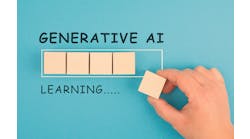New research from Capgemini shows that 48% of executives in the manufacturing sector see generative AI significantly disrupting their business models. 30% of industrial manufacturing organizations are currently piloting innovative design and predictive maintenance that can reduce overhead costs and expensive downtime.
Since ChatGPT and this smarter form of AI is the hottest topic we’ve seen in years, we wanted to dive deeper, so we connected with Ajay Mohan, principal and North American lead of AI & analytics at Capgemini Americas, who shared his perspective on the future of generative AI in the manufacturing sector. Take a look...
Smart Industry: What most surprised you in the survey findings?
Ajay: One of the most surprising findings of our latest study was that generative AI is on the boardroom agenda at 96% of organizations surveyed globally. This widespread interest and recognition of generative AI's importance indicates a significant shift in its adoption and strategic consideration in a relatively short period of time. Throughout my career, there are very few past innovation cycles that have had such a meteoric rise.
Smart Industry: How are manufacturing executives using generative AI? Is adoption as enthusiastic as the hype in this space?
Ajay: Manufacturing executives view generative AI as a powerful tool for accelerating growth, enhancing capabilities, and unlocking new design opportunities. Generative AI is being tested in various ways across the manufacturing industry, with optimizing parts design and advanced 3D modeling being two of the sector’s top use cases. The high-tech and industrial-manufacturing sectors, which have a history of AI adoption, are particularly enthusiastic about the potential of generative AI and understand its potential for disruption. Our research shows that while manufacturing organizations are not implementing at scale as quickly as some other early adopters—high tech and financial services—they will likely be fast followers and extensive adopters.
Smart Industry: How is generative AI disrupting current business models?
Ajay: Generative AI is enabling organizations to reimagine their operations, product and service development, and customer interactions. It has the potential to drive innovation and improve efficiency and productivity across all functions and industries. By leveraging generative AI, businesses can automate processes, optimize resources, implement predictive maintenance, optimize the supply chain, personalize marketing, enhance customer experiences, and make data-driven decisions. These capabilities challenge traditional approaches and enable new avenues for increasing value.
Smart Industry: What's the timeframe for the adoption of these tactics mentioned in the report? Are we talking six months? Six years?
Ajay: Our study shows that the timeframe for the adoption of generative AI tactics can vary depending on the organization and specific context. While generative AI is still in its early stages of scaled adoption and implementation, nearly 60% of executives globally see their leadership as strong advocates for generative AI; organizations are actively exploring and piloting generative-AI initiatives. However, the timeline for widespread adoption can range from several months to several years, depending on factors such as industry, organizational readiness, and the complexity of implementing generative-AI solutions.
Smart Industry: What is the future of generative AI in the manufacturing sector?
Ajay: Generative AI has a promising future in the manufacturing sector. It offers significant potential for driving innovation, improving operational efficiency, enhancing B2B engagement, and optimizing various aspects of the manufacturing value chain. Specifically, with vision-based generative AI, the potential for improved design and innovation is significant. With the ability to automate tasks, personalize experiences, and generate synthetic data, generative AI can help manufacturers stay competitive in a rapidly evolving market. As adoption and understanding of generative AI continue to grow, manufacturing leaders can expect to see more transformative applications and advancements.
Smart Industry: Who/what verticals are best positioned to capitalize?
Ajay: The high-tech and industrial-manufacturing sectors are best positioned to capitalize on the benefits of generative AI. These industries have a long history of AI adoption and have been at the forefront of new AI technologies. They have the necessary expertise, infrastructure, and organizational readiness to implement generative AI effectively.
However, generative AI has the potential to benefit organizations across all verticals and functions. Use cases extend to IT, sales, customer service, marketing, and other areas where automation, personalization, and data-driven decision-making can drive value and competitive advantage.



